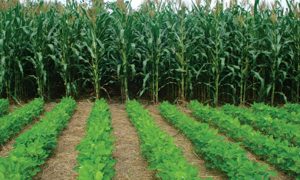
By Nesia Mhaka
Government has formulated a programme of main streaming a Climate Smart Agriculture (CSA) manual in all farming colleges with the objective of guiding lecturers with sustainable solutions of conservative agriculture and resilience building to promote food production.
This follows the realisation that the current agriculture syllabus at colleges and universities did not address climate change issues, mitigation and adaptation and therefore needed to be aligned to current and future issues affecting the industry.
The main streaming of the CSA manual is being facilitated by the department of Agriculture Education and Farmers Training under the Ministry of Lands, Agriculture, Water and Rural Resettlement in partnership with climate change management department under the Ministry of Environment, Climate, Tourism and Hospitality Industry.
The project is funded by the Climate Technology Centre and Network (CTCN), the Green Impact Trust and Adam Smith International among other development partners.
The CTCN is the implementation arm of the United Nations Framework Convention on Climate Change (UNFCCC) technology mechanism and promotes the accelerated transfer of technologies for energy-efficient, low-carbon and climate-resilient development.
Climate Smart Agriculture manual is a document which was designed to provide adequate and effective training on climate change issues to agriculture colleges so that they acquire the expertise to impart climate smart agriculture to build resilience to climate change.
Speaking in an interview yesterday, deputy director of Agriculture Education and Farmers Training, Mr Francis Borgia Vengai said main streaming CSA manual in colleges will help the nation in generating new forms of knowledge, technologies and agricultural support services to improve food productivity.
“This training manual aims to support the transformation of Zimbabwe’s agriculture sector into a sustainable production system by maximising the climate opportunities and reducing climate change-related risks on the agriculture sector.
“The manual is complemented by a capacity building process, including training of trainers which will enable broader dissemination to agriculture students and extension workers across the country.
“Climate smart agriculture should start at colleges and universities. We want students to be innovative and that is how as a country we can be able to sustain ourselves,” he said.
Mr Vengai said the current curriculum does not support the component of climate smart agriculture hence the training of the trainer initiative becomes important for agriculture growth.
“The country faces a challenge in adapting its agriculture education and farmer training component to climate-smart technologies, that is, climate-smart agriculture.
“The current curriculum is not including issues of climate change and the adaptation and mitigation component, and therefore puts at risk agriculture education, farmer training and agriculture productivity since most of the students who graduate from agricultural colleges end up working as agriculture extension workers to, largely, the newly resettled farmers who constitute the bulk of farmers in Zimbabwe,” he added.
Mr Vengai said that the project was introduced with an objective of providing adequate and effective training on climate change issues to agriculture lecturers and students.
“The project aims to facilitate and strengthen sustainable land management , sustainable forest management, and climate-smart agriculture.
“The project facilitates the adoption of climate smart agriculture policies and practices that will help to sustainably increase productivity, enhance resilience (adaptation), reduce or remove green house gases (mitigation) and enhance achievement of national food security and development goals.”
Mr Vengai added that farmers lack adequate knowledge and training on climate change, let alone CSA and sustainable environmental management practices which further increases their vulnerability and risk to the impacts of climate change.
“Most farmers lack adequate knowledge of climate-smart agriculture and sustainable environmental practices, which further increases their vulnerability, as well as the risks to agriculture and the environment.
“The problems the country is facing in the agricultural sector mainly stem from climate change, unsustainable farming methods and the lack of training for agriculture graduate students on enhancing productivity, climate change adaptation and mitigation such as climate-smart agriculture,” he explained.



